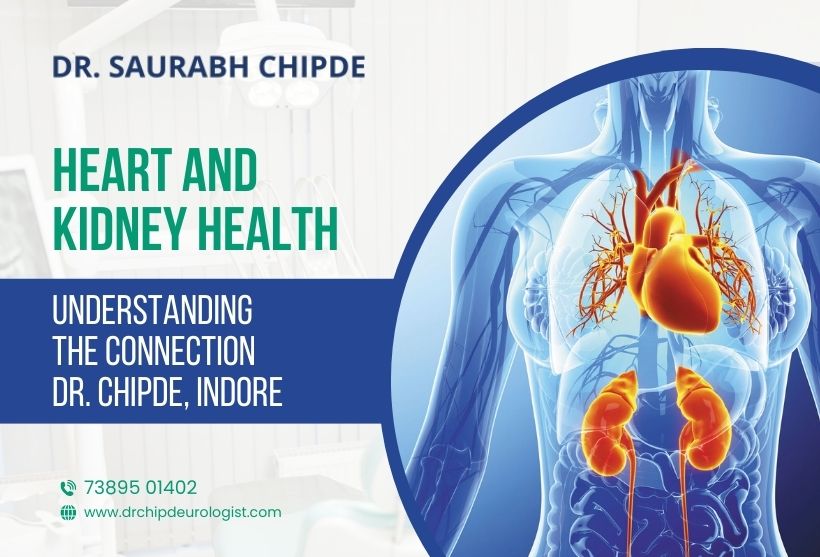Heart and Kidney Health: Understanding the Connection | Dr. Chipde, Indore

The heart and kidneys are two vital organs that work together to keep the body healthy. While they have different functions, they are deeply connected—what affects one often impacts the other. This blog explains the relationship between heart and kidney health and shares essential tips on keeping both in top shape.
How Are the Heart and Kidneys Connected?
The heart and kidneys work together to maintain the body’s overall balance. Here’s how:
- The heart pumps oxygen-rich blood to the kidneys, which filter out waste and excess fluids from the body.
- The kidneys regulate blood pressure by controlling fluid levels and producing hormones that help maintain a stable cardiovascular system.
- Any damage to either organ can lead to problems in the other, making it crucial to care for both.
How Does Heart Health Affect Kidney Health?
When the heart isn’t functioning properly, the kidneys don’t get enough oxygenated blood, leading to potential kidney damage. Some ways heart issues impact kidney function include:
- Heart Failure: A weak heart reduces the blood supply to the kidneys, decreasing their ability to filter waste efficiently.
- High Blood Pressure (Hypertension): Increased blood pressure damages kidney arteries, making it harder for the kidneys to remove waste.
- Heart Disease and Atherosclerosis: Blocked arteries limit blood flow to the kidneys, affecting their function over time.
If the heart is struggling, the kidneys suffer too—this is why regular check-ups with a cardiologist and urologist are essential.
What Are Common Conditions That Link Heart and Kidney Health?
There are several medical conditions that affect both the heart and kidneys. Some of the most common ones include:
- Hypertension (High Blood Pressure)
- It is one of the leading causes of both heart disease and kidney failure.
- Over time, high blood pressure damages both heart and kidney tissues, reducing their efficiency.
- Diabetes
- High blood sugar levels harm blood vessels in the heart and kidneys, leading to long-term complications.
- Diabetes increases the risk of chronic kidney disease (CKD), heart attacks, and strokes.
- Chronic Kidney Disease (CKD)
- CKD is a gradual loss of kidney function that puts extra stress on the heart.
- The weaker the kidneys, the more they struggle to regulate blood pressure, further damaging the heart.
- Fluid Retention and Electrolyte Imbalance
- Poor kidney function can lead to fluid buildup, increasing the workload on the heart.
- An imbalance in sodium, potassium, and other electrolytes can cause irregular heartbeats and other complications.
What Are the Best Ways to Maintain Heart and Kidney Health?
Taking care of both organs requires a balanced lifestyle and regular health check-ups. Here are some practical steps you can take:
- Monitor Blood Pressure—Keep it below 120/80 mmHg to prevent damage to the heart and kidneys.
- Stay Hydrated – Drinking enough water helps the kidneys flush out toxins efficiently.
- Adopt a Heart-Healthy Diet – Focus on incorporating fruits, vegetables, whole grains, and lean proteins into your diet, while minimizing your intake of salt, sugar, and unhealthy fats.
- Exercise Regularly – 30 minutes of daily exercise to keep your heart strong and improve circulation.
- Quit Smoking and Limit Alcohol – These habits give rise to heart disease and kidney failure.
- Maintain a Healthy Weight – Obsessed individuals need to maintain their weight. Since it contributes to heart and kidney functioning.
When Should You Consult a Urologist?
If you experience any of the following symptoms, it’s essential to seek medical advice:
- Signs to See a Urologist (Kidney-Related Issues):
- Frequent urination or difficulty urinating
- Blood in urine
- Swelling in legs or feet (fluid retention)
- Unexplained fatigue or nausea
For comprehensive care, it’s best to consult a specialist like Dr. Chipde,
who can assess your kidney health in Indore.
The heart and kidneys share a deep connection, and keeping both healthy is crucial for long-term well-being. If you have hypertension, diabetes, or any kidney-related concerns, don’t wait for symptoms to worsen—early intervention can prevent serious complications.
If you’re looking for expert advice and treatment, Dr. Chipde, a leading urologist in Indore, is here to help. Whether you need kidney health management or preventive guidance, schedule a consultation today for personalized and effective care.
Take charge of your heart and kidney health—because when one thrives, so does the other!
